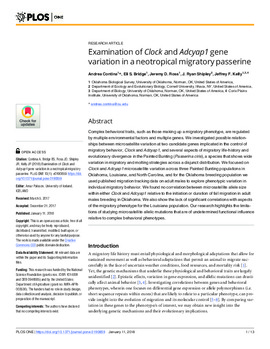| dc.contributor.author | Contina, Andrea | |
| dc.contributor.author | Bridge, Eli S. | |
| dc.contributor.author | Ross, Jeremy D. | |
| dc.contributor.author | Shipley, J. Ryan | |
| dc.contributor.author | Kelly, Jeffrey F. | |
| dc.date.accessioned | 2018-04-06T15:23:53Z | |
| dc.date.available | 2018-04-06T15:23:53Z | |
| dc.date.issued | 2018-01-11 | |
| dc.identifier.citation | Contina A, Bridge ES, Ross JD, Shipley JR, Kelly JF (2018) Examination of Clock and Adcyap1 gene variation in a neotropical migratory passerine. PLoS ONE 13(1): e0190859. https://doi.org/10.1371/journal.pone.0190859 | en_US |
| dc.identifier.uri | https://hdl.handle.net/11244/299322 | |
| dc.description.abstract | Complex behavioral traits, such as those making up a migratory phenotype, are regulated by multiple environmental factors and multiple genes. We investigated possible relationships between microsatellite variation at two candidate genes implicated in the control of migratory behavior, Clock and Adcyap1, and several aspects of migratory life-history and evolutionary divergence in the Painted Bunting (Passerina ciris), a species that shows wide variation in migratory and molting strategies across a disjunct distribution. We focused on Clock and Adcyap1 microsatellite variation across three Painted Bunting populations in Oklahoma, Louisiana, and North Carolina, and for the Oklahoma breeding population we used published migration tracking data on adult males to explore phenotypic variation in individual migratory behavior. We found no correlation between microsatellite allele size within either Clock and Adcyap1 relative to the initiation or duration of fall migration in adult males breeding in Oklahoma. We also show the lack of significant correlations with aspects of the migratory phenotype for the Louisiana population. Our research highlights the limitations of studying microsatellite allelic mutations that are of undetermined functional influence relative to complex behavioral phenotypes. | en_US |
| dc.description.sponsorship | This research was funded by the National Science Foundation (grants nos. IDBR 1014891 and DEB 0946685) and by the United States Department of Agriculture (grant no. NIFA-AFRI-003536). The funders had no role in study design, data collection and analysis, decision to publish, or preparation of the manuscript. | en_US |
| dc.language | en_US | en_US |
| dc.rights | CC0 1.0 Universal | * |
| dc.rights.uri | https://creativecommons.org/publicdomain/zero/1.0/ | * |
| dc.subject | Louisiana | en_US |
| dc.subject | Oklahoma | en_US |
| dc.subject | North Carolina | en_US |
| dc.subject | Animal sexual behavior | en_US |
| dc.subject | Animal migration | en_US |
| dc.subject | Population genetics | en_US |
| dc.subject | Genetic loci | en_US |
| dc.subject | Alleles | en_US |
| dc.title | Examination of Clock and Adcyap1 gene variation in a neotropical migratory passerine | en_US |
| dc.type | Article | en_US |
| dc.description.peerreview | Yes | en_US |
| dc.description.peerreviewnotes | Each submission to PLOS ONE passes through a rigorous quality control and peer-review evaluation process before receiving a decision. The initial in-house quality control check deals with issues such as competing interests; ethical requirements for studies involving human participants or animals; financial disclosures; full compliance with PLOS’ data availability policy, etc. Submissions may be returned to authors for queries, and will not be seen by our Editorial Board or peer reviewers until they pass this quality control check.
Once each manuscript has passed quality control, it is assigned to a member of the Editorial Board, who takes responsibility as the Academic Editor for the submission. The Academic Editor is responsible for conducting the peer-review process and for making a decision to accept, invite revision of, or reject the article. | en_US |
| dc.identifier.doi | https://doi.org/10.1371/journal.pone.0190859 | en_US |
| ou.group | College of Arts and Sciences::Department of Biology | en_US |
| dc.contributor.sponsor | University of Oklahoma Libraries Open Access Fund | |

